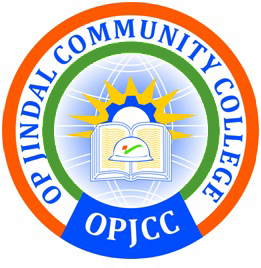





What we do:
Enrich Lives for nation building by providing global quality vocational training to disadvantaged, low-income rural youths regardless of prior educational background in order to equip them with the skills, knowledge, and practical experiences to become gainfully employed or employment creators.
Focus on Quality holistic, relevant skills development and capacity building as the primary tools to address barriers to educational, social, and economic mobility of vulnerable, unemployable persons ages 18-40.
Expand Opportunities by nurturing excellence and believing in the will of the people to learn-by-doing in order to improve the quality of their lives.OP JINDAL COMMUNITY COLLEGE
2014 - 15 in Review
There is a distinctive buzz in the air at OP Jindal Community College these days. Reception areas are packed to the brim with eager young men and women patiently waiting their turn to meet with admission counsellors. Unlike four years ago at the inception of large-scale vocational classes, now people find out about OPJCC by word of mouth. The good news is spreading: OPJCC offers high quality training that leads to decent, respectable jobs in construction, manufacturing, and hospitality services. Due to increased hostel capacity, learners from 14 different states in India enrolled in the colleges in 2014-15 for skills training. With a passion for uplifting India’s rural youths and a focus on imparting high quality technical vocational education and training, OPJCC is intent on transforming lives, helping youths realise their dreams while preparing a world-class, competitive workforce.
Change epitomizes the 21st century workplace due in large part to technology and globalisation. OPJCC’s technical vocational education and training stresses workplace and life skills to prepare individuals to collaborate and communicate effectively, practice occupational health and safety standards, solve problems, and act responsibly. In so doing, dignity of labour, ethical behaviour, and respect for women and differently-abled persons in the workplace are underscored. These characteristics that incorporate the “Jindal Way” of expected work behaviours and attitudes distinguish OPJCC pass out students from their peers.
Learners are at the centre of OPJCC’s world. Many students in vocational courses are school dropouts; however, senior secondary school pass outs are the second largest group. What both groups have in common is the desire to learn by doing in order to earn. OPJCC pass outs find work in the formal economy and they are increasingly working for themselves and creating jobs for others. Employment is the primary education and training outcome of the college. Self-respect and confidence in the learners are intentional by-products. Achieving these results is only possible by focusing on quality. Quality is predicated on having competent, experienced instructors and on-job-training supervision; industry standard infrastructure, machines, and equipment; relevant, needs-based student support services like counselling and job placement assistance; and innovative partnerships.
OPJCC for the People
Established in 2007 as a CSR education initiative, OPJCC today comprises five community colleges located in Chhattisgarh, Jharkhand, and Odisha. School drop-out rates in these predominantly rural states are disproportionately high, especially among young adults. A chronic mismatch between educational outcomes and labour market skills has left millions of rural youths marginalized and unemployable. This results in a loss of valuable human potential and talent, as well as dashed aspirations.
OPJCC represents a bold investment in human development and a genuine commitment to India's future. Each college is open to all learners irrespective of prior educational experiences, gender, religious affiliation, and socio-economic status. OPJCC offers a range of industry-relevant training programmes for beginners, apprentices, and experienced professionals. Trainees range in age from 18 to 45 and include the educated unemployed/unemployable; uncertified workers; ITI, diploma, and degree holders seeking practical technical skills; site supervisors; government workers; vocational teachers; land sellers; and industry-sponsored candidates. Student counseling, job placement assistance, and after-care support make the transition from learning to earning easier.
To meet the skills development needs of local communities and the nation, OPJCC aims to:
OPJCC Student Services
Hostels
Transportation Facility
Stipends &Scholarships
Opportunities to Earn While Learning
Free Medical Exams and Services
Job Placement Assistance
After-Care Support
Transitioning & Migration Counseling
Incubator Cells
WAY FORWARD
To meet our annual target of skilling 10,000 persons, OPJCC will continue to partner with local, state, national, and international partners as well as industries to provide the best quality vocational training to rural India. To achieve this, OPJCC will continue to:
OPJCC 2014-15 HIGHLIGHTS
OPJCC Student Services
Hostels
Transportation Facility
Stipends &Scholarships
Opportunities to Earn While Learning
Free Medical Exams and Services
Job Placement Assistance
After-Care Support
Transitioning & Migration Counseling
Incubator Cells
OPJCC Student Services
Hostels
Transportation Facility
Stipends &Scholarships
Opportunities to Earn While Learning
Free Medical Exams and Services
Job Placement Assistance
After-Care Support
Transitioning & Migration Counseling
Incubator Cells
APRAJITA - Women's Training for Sustainable Livelihoods
Rural women participants |
442 construction trainee 2014-15 |
||||
Average Age |
31 year |
||||
Marital Status |
79% Married - 21% Unmarried |
||||
Average number of children |
2.4 |
||||
Prior Education |
19% not literate | 26% 5th passed | 24% 6th-8th passed | 14% 10th passed | 16% 10+2 passed | 1% above 12th |
||||
Average number of dependents |
3.2 |
||||
Age range of dependents |
1-8 year |
||||
Main source of livelihood |
1) Agriculture; 2) Daily Labour; 3) Farming |
||||
Pre-training average monthly household income |
<Rs 2,000 |
||||
Post-training individual income |
Rs. 6,422 |
||||
Prior work |
57%Average Age |
||||
Placement rate |
89% |
